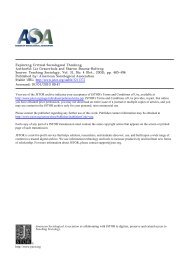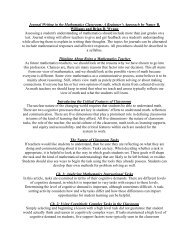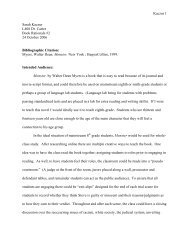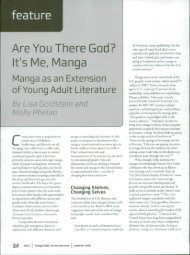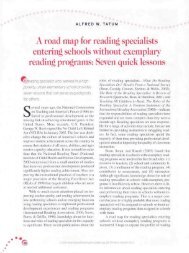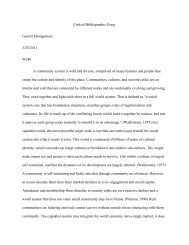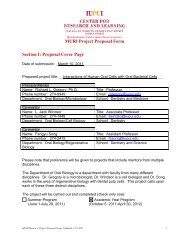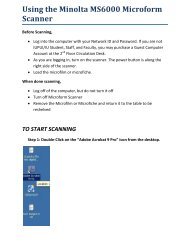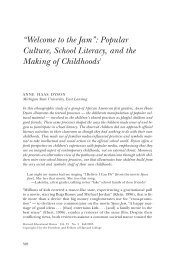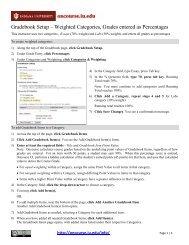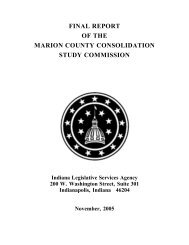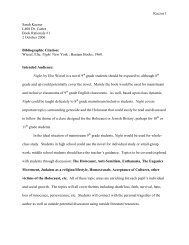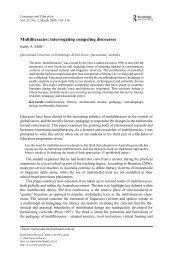McDonald 2004 Critical Reading 10-11 year olds.pdf - Oncourse
McDonald 2004 Critical Reading 10-11 year olds.pdf - Oncourse
McDonald 2004 Critical Reading 10-11 year olds.pdf - Oncourse
Create successful ePaper yourself
Turn your PDF publications into a flip-book with our unique Google optimized e-Paper software.
20 Moving from reader response to critical reading<br />
life for quite some time, let’s just talk about them. I<br />
don’t want you to name names, but what are the<br />
qualities in those friends that you enjoy? What’s<br />
kept you friends over this period of time? Yes?<br />
(Lesson 1)<br />
96S<br />
<strong>10</strong>2S<br />
Her mind is really confused because if she does<br />
go, she might forget about Kim. If she doesn’t go<br />
she’ll lose more friends.<br />
If she’d stop lying, she wouldn’t be in all this<br />
trouble. (Lesson 7)<br />
In this monologue the teacher deliberately invited<br />
discussion from the students’ lived experiences. She<br />
asked them to think about ‘friendship’ in a particular<br />
way: friends were ‘important’, ‘special’, ‘long-term’<br />
and have ‘qualities . . . you enjoy’. For these students<br />
the concept of friendship was constructed as enduring,<br />
rather than ephemeral, and this was perfectly aligned<br />
with the opening paragraph of the novel to be read<br />
aloud further into the lesson.<br />
Students’ stories were elicited when the teacher asked<br />
about friends who ‘‘had to leave for some reason. Or<br />
you had to leave . . . ’’ (50 T, Lesson 1). For example:<br />
67S<br />
73S<br />
Before when I lived in Turkey, my best friend,<br />
she, her dad got transferred to Canada and my<br />
dad got transferred to Turkey and then my dad<br />
got transferred to here and we haven’t stopped<br />
writing and we still keep in touch<br />
When my friend moved, I haven’t seen her for a<br />
couple of <strong>year</strong>s and when I did we had nothing to<br />
talk about<br />
80T . . . Now everyone, the class novel we are<br />
starting today, is in fact a story of a great<br />
friendship and a friendship which actually starts<br />
at the beginning of the story with an announcement<br />
by one of the main characters that she is<br />
leaving, that she is going (Lesson 1)<br />
The public space of the classroom reconstrued the<br />
experiences of individual students, when shared, as<br />
community experiences. Here the teacher constructed<br />
a group experience which aligned with the experiences<br />
of the protagonist: she positioned her students to read<br />
from ‘within’ the text. What counted as reading here<br />
was perceiving characters as ‘humans’ whose ‘life’<br />
experiences reflected those of the readers. The students’<br />
stories contributed to the development of a<br />
reader response discourse.<br />
In Lesson 7, the teacher promoted the students’<br />
empathy for the protagonist Susie by asking for<br />
inferences about Susie’s ‘excuse’ that her mother may<br />
not let her attend the planned party, as can be seen in<br />
the following excerpt:<br />
85T<br />
88S<br />
90S<br />
92S<br />
94S<br />
. . . What is really at stake for Susie in all of this<br />
party stuff? What is really there for her?<br />
She could lose her self-confidence after if the boy<br />
said something like you are disgusting.<br />
Like if she has a good time and forgets about<br />
Kim.<br />
She could be humiliated at the party.<br />
If she goes and she doesn’t play the game, she<br />
will lose her friends.<br />
In this excerpt the students inferred a variety of<br />
reasons for Susie’s excuses to her friends. These<br />
reasons were constructed from the students’ cultural<br />
logic and made Susie’s words plausible. Evidence for<br />
this claim lies in the language of the students:<br />
inferences are apparent in the students’ consistent<br />
use of the conditional conjunction ‘if’ (88S, 90S, 94S,<br />
96S, <strong>10</strong>2S) and the modal language of probability<br />
‘could’ (88S, 92S) and ‘might’ (96S). Furthermore, the<br />
kind of information they gave concerned the character’s<br />
feelings and behaviours, and this is evident in<br />
the students’ use of such ‘mental’ and ‘behavioural’<br />
types of verb as ‘forget/s’ (90S, 96S), ‘humiliated’ (92S),<br />
‘confused’ (96S), ‘lying’ (<strong>10</strong>2S), and such metaphorical<br />
constructions as ‘lose her self-confidence’ (88S) and<br />
‘lose her friends/lose more friends’ (94S/96S). What<br />
counts as reading here is the ability to project possible<br />
feelings and behaviours onto a character and to make<br />
deductions from the character’s thoughts. In this part<br />
of Lesson 7, this kind of classroom talk could be seen as<br />
an instance of ‘reader response’ theory applied in<br />
classroom practice.<br />
The teacher’s commentary on each response (not<br />
included in the example above) indicated her agreement<br />
with both the content of the students’ replies and<br />
the strategy they used to arrive at their answers. Such<br />
comments as ‘‘I have not thought of that’’ (91 T), and<br />
her sharing ‘‘I have had a few [embarrassing experiences]<br />
that are unbelievable’’ (97 T) gave authority to<br />
the use of this strategy of projection into a fictional text.<br />
The students’ projection of real-world cultural/social<br />
knowledge of how friendships ‘work’ was continued<br />
in line <strong>10</strong>2S: ‘If she’d stop lying, she wouldn’t be in all<br />
this trouble’’, where a student challenged the empathetic<br />
stance of the group’s responses.<br />
When this student resisted the reading position<br />
constructed by the teacher, she took up a critical<br />
stance. The student’s comment offered the possibility<br />
of an analytical reading: the teacher could have<br />
examined the potentiality of different reader positions,<br />
for example, are readers meant to agree with Susie’s<br />
‘excuses’ and reticence, or disagree? Arguably, the<br />
teacher deliberately remained within the reader<br />
response discourse, ignoring the challenge and using<br />
the comment as a springboard for more personal<br />
stories, as can be seen in the excerpt following:<br />
<strong>10</strong>2S<br />
<strong>10</strong>3T<br />
If she’d stop lying, she wouldn’t be in all this<br />
trouble.<br />
Yeh, let’s, yeh good. Let’s talk about that. You are<br />
right spot on that is where I want to be. Have<br />
you ever made up an excuse before, to cover<br />
r UKLA 2003



